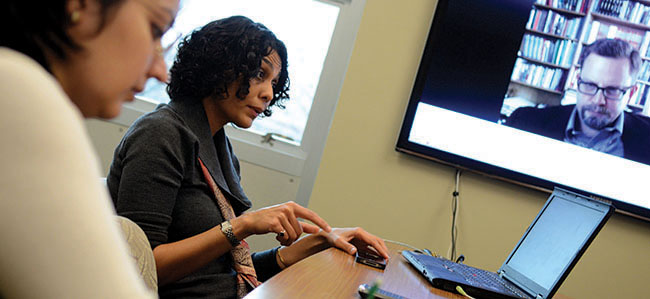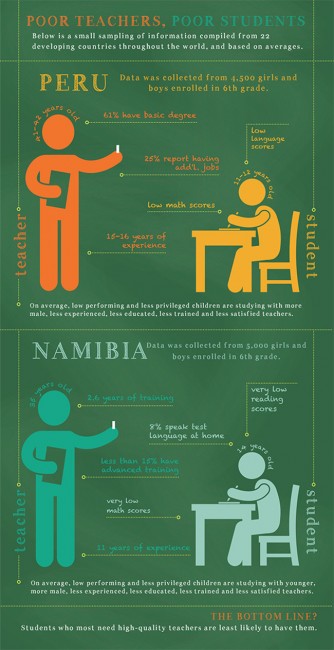
BY SARAH WARDELL
The perception of a young Amita Chudgar—now an assistant professor of educational administration at the College of Education—may be described as anything but ordinary.
Growing up in India, Chudgar lived in a non-traditional, middle-class Mumbai household with surgeon parents. At the end of 10th grade, Chudgar made a choice that many schoolchildren in India must make: the direction of their career path.
Chudgar chose social science—“a less prestigious decision,” she says—in comparison to her peers who opted mainly for commerce, engineering or medicine. The choice wasn’t a popular one.
“The decision broke from a perceived social norm, which freed me from seeing the world through a narrow lens,” Chudgar adds.
She even had a school principal tell her that she had ruined her future.
While the societal opposition she faced was steep, Chudgar went on to earn both a bachelor’s and master’s degree in economics with a quantitative concentration at University of Mumbai. She graduated with honors and received a prestigious gold medal in economics.
Take that, naysayers.
Chudgar then went on to discover her passion for social issues while teaching economics to undergrads in Mumbai. It was here she had one of many aha moments concerning her desire to contribute to pressing social challenges using sophisticated research and analysis.
“Economics are beautiful, really,” Chudgar says with a smile. “It’s beautiful to be presented with complex situations and to find simple, elegant patterns … It’s really very exciting to me and I am fascinated by research that systematically makes sense of human behavior.”
After turning down a full ride at University of Oxford, Chudgar continued her journey at University of Cambridge to pursue a multidisciplinary master of philosophy in development studies. After Cambridge, Chudgar worked for a year on multiple research projects in rural India. It was here that she identified education policy and equity as the primary social issue she wanted to focus on, and pursuing a Ph.D. in Economics of Education at Stanford University was the next logical step.
“There are so many issues in this world, and I have decided to focus on educational challenges more closely,” Chudgar says. “I went to far-flung schools in India and saw deplorable teaching-learning conditions. I have seen classrooms with hardly any furniture or learning material, teachers teaching with few resources and bright, enthusiastic children short-changed by an under-resourced system.”
Chudgar adds: “Deep-rooted gender inequities and unfair social norms often make these challenges even harder to address. The consequences of these disadvantages are similar everywhere, even Detroit—all our children are unable to access quality education. It’s simply not okay anywhere for this to be happening.”
Fast-forward to today, and one sees clearly that Chudgar has established herself as a leading researcher in the study area of disadvantaged children worldwide, and the implications of their resource-constrained conditions. In October 2012, Chudgar released study findings that contradicted past research by concluding there is no systematic benefit for school-aged children to attend private versus public schools, if the vast differences in their home backgrounds are carefully accounted for.
Now, with several awards and honors throughout her career, Chudgar remains humble, saying that she feels very privileged to do the work she does. “I feel fortunate. I love what I do. This is my passion—this work breaks my heart and brings me to tears.”
Chudgar places a high value on mentoring, and is currently working with three graduate students, James Pippin, Ben Creed and Madhur Chandra. Along with colleagues from Claremont Graduate University, the team is generating a cross-national understanding of teacher distribution across more than 20 countries through a $229,000 UNICEF-funded grant project that will wrap up in late 2013.
A Global Partnership
In partnership with the Azim Premji Foundation in India, Chudgar and Chandra are currently working with Radhika Iyengar from Teachers College, Columbia University on the Child Friendly School Initiative (CFSI). The team has collected two waves of data from 90 schools, which includes about 3,000 children, to examine the association between learning levels and community attributes.
“Perhaps the most exciting outcome of this joint research project is a panel I have organized at the upcoming Comparative and International Education Society’s Annual Conference in March 2013,” she says. The panel will consist of four papers related to the project, and Chudgar says she’s expecting three to four members from the foundation’s research team to attend.
“I am very glad that just as we are able to benefit from their research and data collection capabilities on the ground, we are able to share this international exposure and attention with them,” she says.
When asked about her future plans, Chudgar says she intends to expand her work with bolder projects. “The research community at MSU has been incredibly supportive, and I appreciate the institution’s commitment to global issues,” she adds.
Exploring urban education may also be on the horizon for Chudgar, as the relevancy of her current work in resource-constrained environments abroad would be a natural foray into an area with similar issues and challenges closer to home.
For now, Chudgar is content living a multi-continental lifestyle, speaking at international conferences and performing groundbreaking research—with her biggest “problem” being that her passport is too full.





